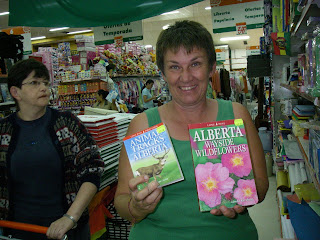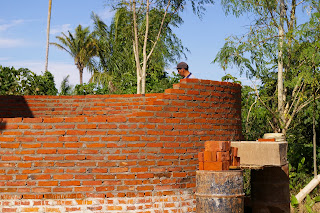How so I begin? How much do I say? What is important? All
these questions go through my mind as I sit down to write. I did not know Jose Luis except to see him play while we helped build the church in
Vibora. His dad is part of our Church Leaders' Group but I have only met him a few times since he was not always able to attend. And the biggest thing is that although I played a large part in this story I know that it was only the hand of God that put me there.
Jose Luis entered the Children's Hospital in a coma. He had already had a CT scan and his parents were told that he suffered an aneurysm The next day the diagnosis was changed to meningitis. Jose Luis remained in a deep coma and his brain no longer functioned. His face was chilly to the touch and his eyes were vacant. Wisely, the parents choose not to purchase medications so little by little Jose Luis faded away. The doctors wished to harvest his organs but that was not something that his parents could even contemplate. On Wednesday afternoon, Jose Luis blood pressure fell to such a level that the doctors were willing to remove the oxygen and declare him dead. As hard as that was, it was a relief that it was finally over. Once we knew the death was
imminent, everything moved very quickly.
Although there are funeral services available in Bolivia, the family did not have the money or the inclination to purchase these services. Instead Julio, Jose Luis' father, and I went down the street and purchased the casket -- a simple white box with a small piece of glass so that the face could be viewed. Before we could take possession of the casket, we needed the death certificate. Back to the hospital. All the tubes and
paraphernalia had been removed and Jose Luis was again dressed in his own clothes and his body was put on a gurney in the hall.
Back to the funeral home with the documentation. It is Bolivia but there are still some things that are not done -- you do not carry the casket down the street. Instead the men from the funeral home took it in their car to the hospital. In the meantime, there was an attempt to convince the family to have the body brought to the funeral home for embalming. Frankly, we told him they could do it but there was no money to pay them. Strangely, they did not force the issue.
One cannot leave the hospital until all the bills are paid so Julio was doing that while we were preparing the body and putting it in the coffin. He did not have enough money. Yes, the bed itself costs 120
bolivianos a day but one still has to pay for the oxygen and all the monitoring machines. The total bill with the discount still came to over 11
oo bolivianos for four days.
The casket was taken out of the hospital and loaded into the back of the truck along with the other things we had purchased. Julio was quite anxious about being stopped at one of the check stops so we made sure that the casket was covered with a tarp and that there was enough other things in the truck so that there would be no need to be stopped.
After a short stop in
Yapacani and other in
Challavito we arrived at the church in
Vibora where the coffin was placed in the church. No one had any experience with death or funerals so each event was discussed before it took place. The family wanted the body washed so that was the first step. That provided a good time to explain what had happened with the meningitis, what had happened to the body already and what would happen in the next day. After a time of worship it was time to rest. Many of the people simply slept in the church that night.
The next morning the men built the crypt for the coffin. This is a brick structure built above ground and the coffin in slipped in the mouth and then sealed with more bricks. When this was completed, dinner was served followed by a short service. Then the body was carried to the cemetery and placed in the crypt after a short service and prayer.
Bolivians do not show their sorrow or support in the way we are accustomed. The mother was sobbing, distraught, but no one 'comforted' her. No one except the parents cried although it was evident through their support that they cared. There was no touching, no hugging, no crying together. We hope that the community continues to support but we also have to remember that their view of death is in many ways more realistic than that of North Americans. We know that Julio's faith is strong and that certainly will carry them a long ways.
 the delegation so their title was delivered to the president. However, Taruma held a grand fiesta to which we were invited.
the delegation so their title was delivered to the president. However, Taruma held a grand fiesta to which we were invited. se communities.
se communities.






















